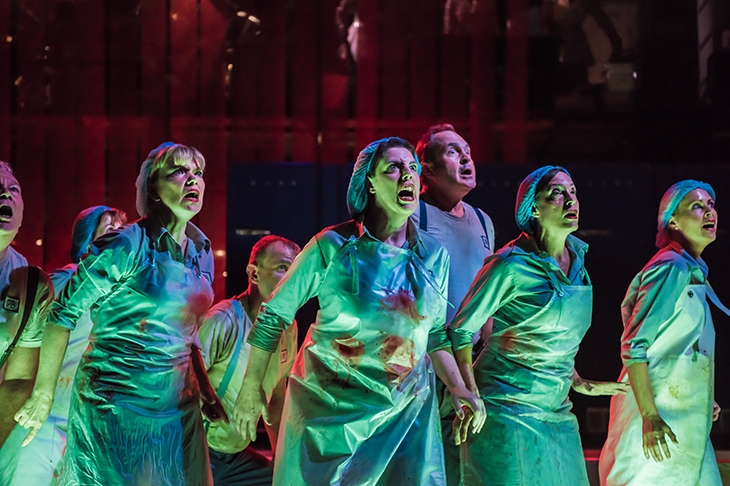‘I feel I have learned lots about what not to write for the theatre…’ There’s a prevailing idea that the ever-precocious Benjamin Britten was an operatic natural — a composer whose gift sprang fully formed with the première of Peter Grimes in 1945. But that’s not strictly true. Go back just a few years to 1941 and you’ll find Paul Bunyan — the oversized skeleton in Britten’s musical closet.
Rewind those few years and Britten, darling of post-war England, was all but a national pariah. A pacifist who had escaped conscription by travelling to America, he was forced to take work wherever he could find it. ‘Simple, marketable works’ was his publisher’s edict, and that’s how Britten and fellow émigré W.H. Auden found themselves collaborating on a ‘high-school operetta’ inspired by America’s trippy original myth of Paul Bunyan — a lumberjack as tall as the Empire State Building with a blue ox called Babe for a best friend — whose leadership helped loggers to clear the way for the American Dream.
The result is a bewildering collision of styles and tones. Britten’s score is a folksy, flannel-wearing, feelgood slab of melody, oozing juicy tunes like a home-made cherry pie, while Auden’s tricksy libretto is all slick metropolitan satire and cynicism. In their hands, a Walt Whitman-style, prelapsarian fantasy becomes complicated, suddenly at war with itself.
Whether this is a war that it’s possible to win (or even one that’s worth fighting) on stage is uncertain. ENO certainly throws all it’s got at the company’s first ever staging of this curiosity. Cramming Coliseum levels of energy, volume and manpower into the period shoebox of Wilton’s Music Hall, it opts for total-annihilation shock and awe. The effect is often deafening, sometimes awkward, and intermittently absolutely thrilling.
Jamie Manton’s production allies itself firmly with Auden and his ‘homespun humour manufactured in the city’. Gone are the woods and wholesome outdoorsiness (they wouldn’t have fitted anyway); in their place we have an unapologetically urban American Dream. Paul Bunyan Inc. is the very model of a modern logging company, complete with flipcharts, strategy documents, Starbucks and a labour force of exploited workers. Dogs and cats become diner waitresses, Babe a big blue fridge, while Britten’s ballad-singing narrator is transformed into a hard-hatted trio of female supervisors. Paul Bunyan himself (an invisible presence, heard but never seen in Britten’s score and voiced here by a laconic Simon Russell Beale), fits in perfectly — the faceless paymaster of corporate America.
The visual ideas come quick and fast, conspiring with Auden’s relentlessly clever text to dazzle and divert. Does it move? Not a bit of it; nor does it have any interest in doing so. Even the lovely lament Bunyan’s daughter Tiny sings for her dead mother (beautifully delivered by soprano Rowan Pierce) invites suspicion in such a context — as though Manton and Auden might leap out at any moment and yell ‘Gotcha’.
But perhaps it’s an elaborate double bluff. Because against this overworked conceptual backdrop the uncomplicated commitment and zeal of the ENO chorus and ensemble of young soloists are utterly disarming. Under the immaculate direction of Matthew Kofi Waldren — the straight man to Manton’s joker — the chorus gives it the full Broadway, triple threats to a man. Then there are the three young Harewood Artists at the centre of the show: Pierce’s Tiny sweet and unsullied; William Morgan charismatic as cowboy-cook Hot Biscuit Slim, giving us some of the crooning ease lost along with the balladeer; and Elgan Llyr Thomas singing up an absolute storm as intellectual manqué Johnny Inkslinger.
It all adds up to a fine evening’s entertainment. But, like American critic Virgil Thomson at Paul Bunyan’s première, I never did figure out what it was all about.
From a young man’s experiment to an old man’s near-final thoughts. Handel’s Theodora is the composer’s penultimate oratorio and as radiantly, rapturously lovely a work as anything he ever wrote. Which is fortunate, because it’s also one of the most dramatically stilted. Characters end as they began, and absolutely nothing happens until the last ten minutes. But, as Jonathan Cohen and his period ensemble Arcangelo demonstrated beyond doubt in their Proms performance, none of that matters when the musical drama is devastating in and of itself.
Pulling off the conjurer’s trick of being ferociously precise while seeming absolutely spontaneous, Arcangelo’s musicians were breathtaking — the players singing the text no less clearly with every gesture and inflection than the chorus. Add to that a crack cast led by Louise Alder’s Theodora — vocal fire coolly cased in amber here for Handel’s chilly princess — and Iestyn Davies — all ardent, melting warmth — with the peerless Ann Hallenberg pure luxury as Irene, and you have all the drama you need. After all, nobody ever went to Handel for the plot.






Comments